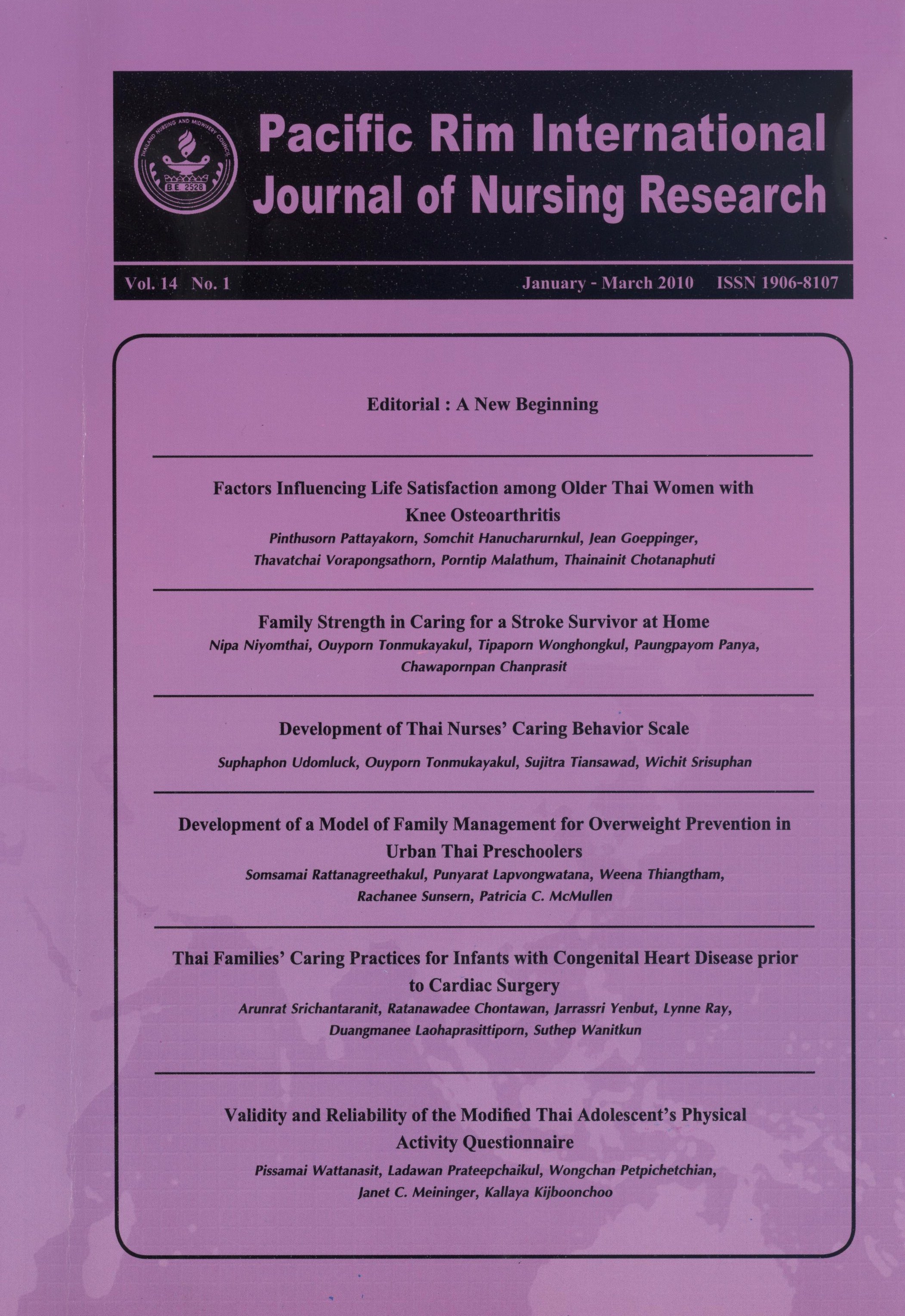Thai Families’ Caring Practices for Infants with Congenital Heart Disease prior to Cardiac Surgery
Keywords:
โรคหัวใจพิการแต่กำเนิด, การวิจัยเชิงชาติพันธุ์วรรณนา, ทารก, การปฏิบัติดูแล, ครอบครัวไทย, Congenital heart disease, Ethnography, Infants, Caring practices, Thai families.Abstract
บทคัดย่อ
การวิจัยเชิงชาติพันธุ์วรรณนานี้ มีวัตถุประสงค์เพื่อศึกษาอิทธิพลของบริบททางสังคมวัฒนธรรมต่อการรับรู้และการปฏิบัติของครอบครัวไทยในการดูแลเด็กอายุ 3-17 เดือน ที่เป็นโรคหัวใจพิการแต่กำเนิดทั้งชนิดเขียวและไม่เขียวที่มีอาการในระยะก่อนผ่าตัดหัวใจ คัดเลือกกลุ่มตัวอย่างแบบเฉพาะเจาะจง กลุ่มตัวอย่างคือพ่อแม่ จำนวน 12 คน และสมาชิกครอบครัว จำนวน 2 คน จาก 8 ครอบครัว ที่พาเด็กมารับการรักษาที่โรงพยาบาลมหาวิทยาลัย 2 แห่งในกรุงเทพมหานคร เก็บข้อมูลโดย การสัมภาษณ์แบบเจาะลึก การสังเกตแบบมีส่วนร่วม และการจดบันทึกภาคสนาม จากเดือนกันยายน 2549 ถึงเดือนตุลาคม 2550 วิเคราะห์ข้อมูลโดยใช้วิธีการวิเคราะห์เชิงเนื้อหา
การปฏิบัติดูแลของครอบครัวได้รับการอธิบายจากถ้อยคำที่กล่าวว่าทำดีที่สุดเพื่อช่วยให้เด็กพร้อมที่จะได้รับการผ่าตัด ครอบครัวเข้าใจว่าเด็กที่เป็นโรคหัวใจอาจไม่รอดชีวิต และเป็นเด็กเลี้ยงยากและเติบโตช้า เด็กที่เป็นโรคหัวใจทุกคนต้องได้รับการรักษาทางยาตามด้วยการผ่าตัดและต้องการน้ำหนักตัวที่เพิ่มขึ้นและสุขภาพที่แข็งแรงเพื่อฟื้นตัวจากการผ่าตัด ครอบครัวป้องกันไม่ให้เด็กมีอาการเลวลงพร้อมทั้งจัดการดูแลเด็กภายใต้ข้อจำกัดต่างๆ
ผลการศึกษาบ่งชี้ว่าการรับรู้และการปฏิบัติของครอบครัวได้รับอิทธิพลจากสังคมวัฒนธรรมได้แก่ คำสอนทางพุทธศาสนา ความเชื่อทางวัฒนธรรม ข้อจำกัดทางการเงิน บริการของโรงพยาบาล รวมทั้งการได้รับความช่วยเหลือจากสมาชิกในครอบครัวและบุคคลภายนอกครอบครัว ผลการศึกษาครั้งนี้ให้ความเข้าใจกับแพทย์และพยาบาลเกี่ยวกับการรับรู้และการปฏิบัติของครอบครัวในการดูแลเด็กโรคหัวใจพิการแต่กำเนิดในระยะก่อนผ่าตัด และยังชี้ให้เห็นธรรมชาติในการดูแลของครอบครัวที่มีความเกี่ยวเนื่องกับบริบท รวมทั้งความต้องการบริการสุขภาพรูปแบบใหม่ที่สร้างสรรค์และสอดคล้องกับบริบททางสังคมวัฒนธรรม
คำสำคัญ: โรคหัวใจพิการแต่กำเนิด; การวิจัยเชิงชาติพันธุ์วรรณนา; ทารก; การปฏิบัติดูแล; ครอบครัวไทย
Abstract
This focused ethnographic study aimed at exploring how the Thai socio-cultural context influenced the perceptions and practices of Thai families caring for infants, 3 months to 17 months, with symptomatic, acyanotic or cyanotic, congenital heart disease (CHD), prior to cardiac surgery. Purposive sampling was used to recruit twelve parents and two family members, from eight families, who brought their infant with a CHD, to two university hospitals in Bangkok. Data were collected through in-depth interviews, participant observations and field notes, from September 2006 to October 2007, and analyzed through use of content analysis.
Family care practices were characterized by the phrase: “doing our best to get our child ready for surgery.” Families understood their infants may not survive and would be difficult to care for. All the infants required pharmacological management, followed by surgery, and needed weight gain and strength to withstand and recover from surgery. Families prevented their children from getting worse, as well as managed their respective infant’s care under significant constraints.
Findings indicated the families’ perceptions and practices were influenced by the socio-cultural contexts, which included Buddhist teachings, cultural beliefs, financial constraints, hospital services, and support from family members and significant others. The results provided health professionals with an understanding of perspectives and practices of Thai families providing care, prior to surgery, for infants with CHD, and highlighted the context-dependent nature of family care and need for new and creative ways to provide culturally congruent professional care.
Key words: Congenital heart disease; Ethnography; Infants; Caring practices; Thai families.
Downloads
How to Cite
Issue
Section
License
Copyright: The Pacific Rim International Journal of Nursing Research, Thailand Nursing & Midwifery Council has exclusive rights to publish, reproduce and distribute the manuscript and all contents therein.








.png)



